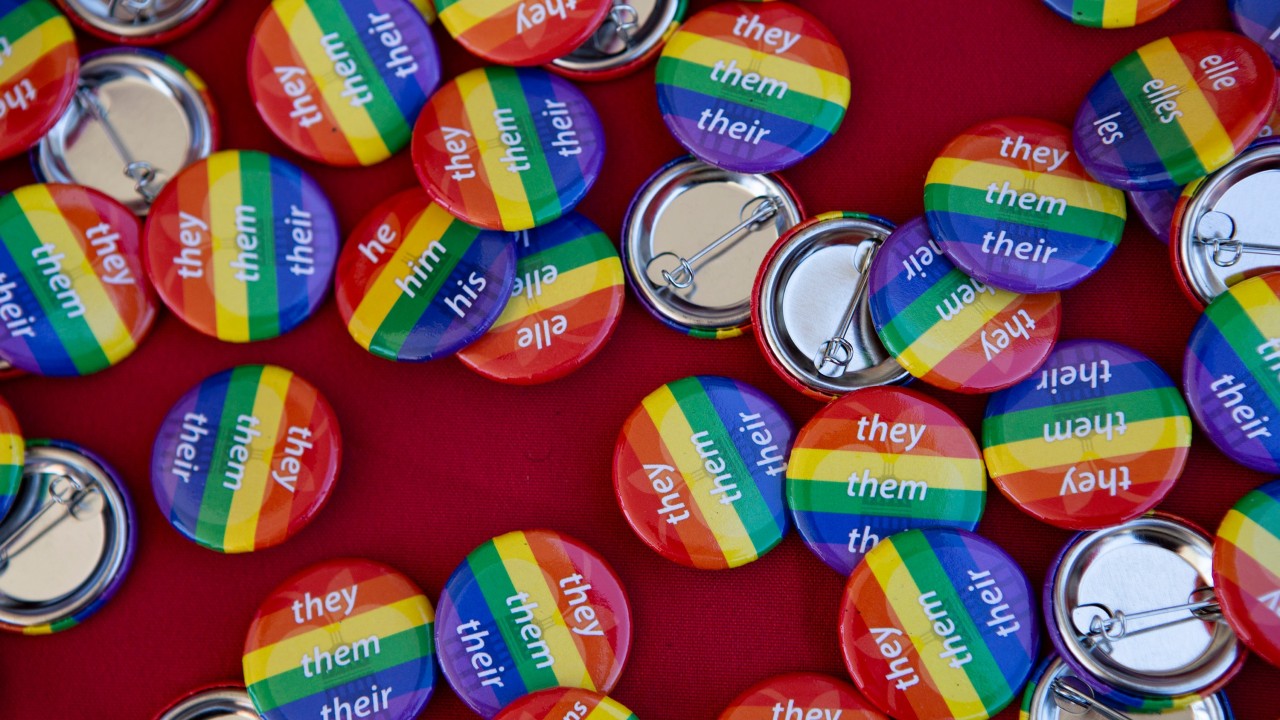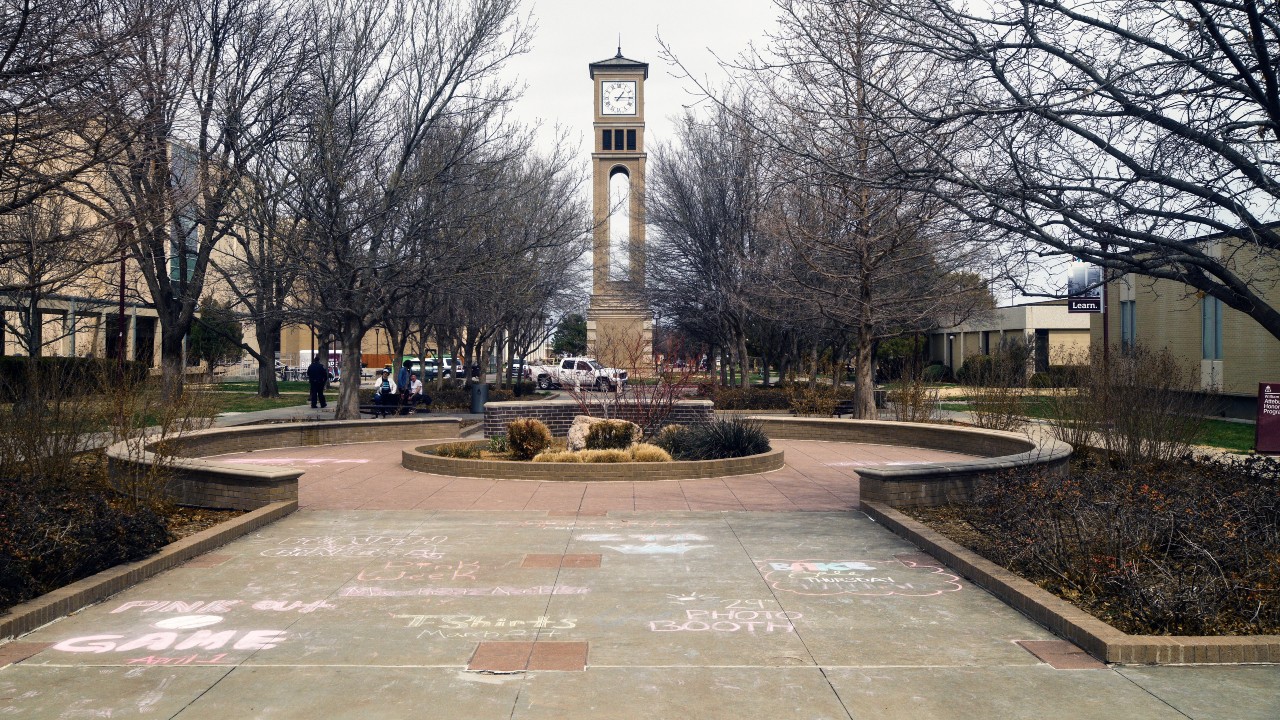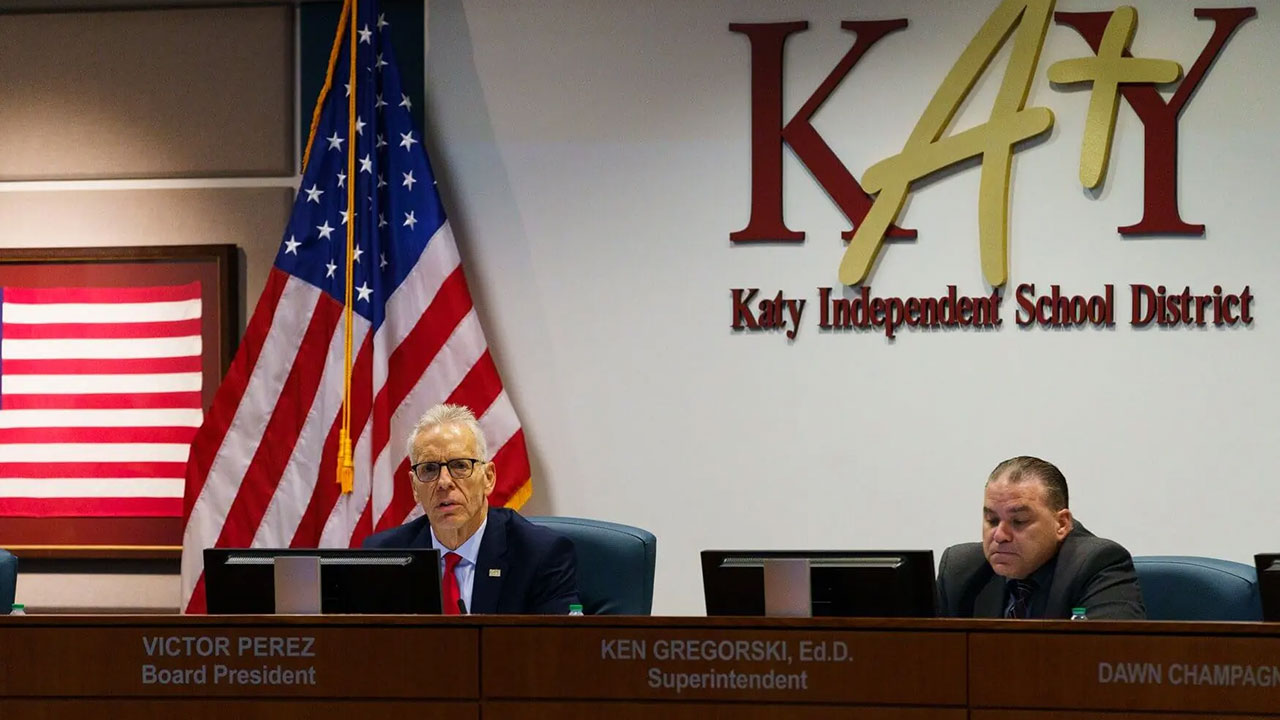US
How did trans people become a GOP target? Experts say it’s all about keeping evangelicals voting
The recent blitz of anti-trans bills may not align with what many Republicans believe, but party lawmakers pursue them on behalf of their most important interest group.

This story was originally published by The 19th
 When it came down to it, Rick Colby called on his spirituality in deciding how to support his transgender child, Ashton.
When it came down to it, Rick Colby called on his spirituality in deciding how to support his transgender child, Ashton.
It wasn’t a guarantee. Colby had dedicated his life to Republican politics, starting in 1984 on the field campaign to reelect Ronald Reagan. Reagan and the Republican Party with him and in the decades following would push anti-LGBTQ+ policies. But Colby’s Methodist church by comparison preached inclusivity and empathy, a message that conflicted with what he was hearing from Republicans.
Colby went with Ashton to his first endocrinologist appointment. He held Ashton’s hand the following year as Ashton awoke from gender-affirming top surgery.
“You know, as a parent, you want to protect your child from the nastiness of the world,” Colby said. “I was so relieved as a parent that he was being accepted. And it was just wonderful.”
Survey after survey show that Americans support LGBTQ+ equality, and Republicans are no exception. Still, Republican-dominated states have seen a blitz of anti-LGBTQ+ legislation since 2020, particularly anti-transgender bills. That dissonance — between the reality of the electorate and the priorities of Republican lawmakers — may seem counterintuitive to many.
Randall Balmer, a Dartmouth professor who was raised evangelical, has spent much of his career researching those kinds of contradictions. His book, Bad Faith: Race and the Rise of Religious Right traces the rise of the evangelical voting bloc from nonexistent in the 1960s to the single most important interest group for any Republican candidate in the 1980s. In a conversation with The 19th, Balmer said that rise was driving Republican support for anti-trans legislation now.
“They have an interest in keeping the base riled up about one thing or another, and when one issue fades, as with same-sex relationships and same-sex marriage, they’ve got to find something else,” Balmer said. “It’s almost frantic.”

While many people believe that abortion was the issue that first galvanized evangelicals to the polls in the 1980s, Balmer points to a different issue. Paul Weyrich, an evangelical Christian who helped initially organize the “religious right,” had been testing out issues that would drive other evangelicals to the polls in the 1970s, Balmer says. Weyrich found it in Bob Jones University, a religious institution that was facing the loss of its tax-exempt status for refusing to racially integrate.
Weyrich’s strategy worked. In 1980, evangelicals – a group of denominations separate from mainline churches like Colby’s – flocked to the polls to back what had been billed as the freedom of a religious school to operate without government interference. Reagan backed Bob Jones University, with two-thirds of the evangelical vote, denied President Jimmy Carter, a Democrat and an evangelical himself, a second term. It cemented White evangelicals as the key ingredient to Republican wins.
Any Republican who wanted to cross the finish line would have to kneel at the feet of the evangelical base, Balmer says. Decades later, Donald Trump would initially campaign on welcoming LGBTQ+ people into his Republican platform, only to later adopt the ideology of the far-right evangelical base he needed to win.
While Trump appeared to start out a social moderate, far-right evangelical policies increasingly dominated his agenda. On the campaign trail, Trump briefly vowed to be an ally to queer Americans. In office, his administration made so many policy moves against LGBTQ+ Americans that advocacy organizations branded his leadership “The Discrimination Administration.”
The religious right’s fixation on “social issues” — abortion, religious-based education, LGBTQ+ rights — served two purposes. In addition to keeping evangelicals a cohesive voting unit, they also formed an ideological bedrock for the religious right. Before Weyrich died, he argued that conservatives should be fighting to return to family structures of the 1950s, a goal that has been picked up by leaders after him.
In his book The Next Conservatism, Weyrich wrote that the goal was to weed out “cultural Marxism,” and “restore a non-ideological American republic, which is what we had up until the wretched 1960s,” when women and Black and LGBTQ+ Americans pushed for and won greater rights.
After Reagan’s 1980 victory, Weyrich would continue to test issue after issue to keep evangelicals voting, including abortion. This idealized rewind to 1950s America would systematically challenge the basic rights gained by Black Americans, LGBTQ+ people and those with disabilities.
“As they were searching for different issues, I think they understood that any issue that had some sort of connection to sexuality or sexual behavior was going to work for them,” Balmer told The 19th.
The first issue was “sodomy laws,” which aimed to make gay sex illegal. The Supreme Court overruled the last of them in 2003 in Lawrence v. Texas. Next came marriage equality, which was granted nationwide by the Supreme Court’s Obergefell ruling in 2015. Still, according to the Public Religion Research Institute, evangelical Protestants were the only major religious group as of 2020 that opposed same-sex marriage: just 34 percent of those surveyed support marriage equality.
The country, however, moved on.
“It’s staggering how quickly [marriage] disappeared as an issue,” Balmer said “And so, they almost frantically began looking for something else. And of course, the trans thing was the next thing on the horizon.”
Today, nearly 8 in 10 Americans back nondiscrimination protections for LGBTQ+ people, according to a poll from the nonpartisan Public Religion Research Institute. That includes 65 percent of Republicans. A 2021 poll by PBS NewsHour/NPR/Marist poll found that two-thirds of Americans opposed bills limiting the rights of transgender people.
Still, since 2020, 15 states have passed laws barring transgender kids from playing sports in their lived genders. Three have put laws on the books to prevent trans kids from accessing care for gender dysphoria recommended by major medical associations. Two have outlawed mention of LGBTQ+ history or people for young kids in public schools.
Maps of states that have passed laws that would ban abortion if the Supreme Court struck down Roe v. Wade almost mirror those that have passed anti-trans bans. Eleven of the 15 states with a sports participation ban for trans youth have also moved to curtail abortion rights.
Zein Murib, assistant political professor at Fordham University, says that overlap is no mistake.
“They’re saying, ‘Forget about rights. This is about bodies,’” Murib said. “This is about these bodies being in places where they again presumably do not belong. … You see them deploying scare tactics like, ‘men disguised as women in girls’ restrooms’ or ‘boys in girls’ locker rooms.’”
As 19th News found in an investigation in 2021, the vast majority of anti-transgender bills never use the word “transgender” at all. Lawmakers instead pitch the bills as critical to securing rights for women in sports and larger society. Those arguments fail to acknowledge transgender women, and advocates say they are increasingly out of touch with the general electorate.
Chris Bull is the editorial director of queer media firm Q.Digital and the author of the 2001 book Perfect Enemies: The Battle Between the Religious Right and the Gay Movement. Bull argues that Republican lawmakers have abandoned 80 percent of their voters to cater to a sliver of their voters.
“I think that the cliche of American politics is not holding anymore,” he said. “They’re really running base campaigns, that 20 percent of the electorate.”
Still, political scientists warn that the strategy to attack trans rights could backfire and cost them support among an increasingly diverse electorate. More Americans, like Colby, know transgender people than ever before. More than that, evangelicals are statistically shrinking as a voting block, while the number who support LGBTQ+ people continues to rapidly grow.
In the 2018 midterms, the Human Rights Campaign, with polling firm Catalyst, found that people they dubbed “equality voters,” those whose support for LGBTQ+ rights strongly influenced their voting choices, made up 29 percent of the electorate. White evangelicals made up 26 percent of the vote.
The 19th is an independent, nonprofit newsroom reporting at the intersection of gender, politics and policy.
Education
Feds investigate another Texas school district for its gender identity mandate
Katy ISD’s board voted this past fall to require staff to notify parents if their child wants to use a different pronoun or identifies as a different gender.

This article originally appeared in The Texas Tribune
 The U.S. Department of Education’s Office for Civil Rights opened an investigation Monday into Katy Independent School District’s gender identity policy on the basis of gender harassment under Title IX. The investigation came nine months after the Houston Landing reported that the district adopted a policy that notifies parents if their child requests to use a different name or pronouns at school.
The U.S. Department of Education’s Office for Civil Rights opened an investigation Monday into Katy Independent School District’s gender identity policy on the basis of gender harassment under Title IX. The investigation came nine months after the Houston Landing reported that the district adopted a policy that notifies parents if their child requests to use a different name or pronouns at school.
Katy ISD did not respond to a request of how many parents have been notified this year under the new policy, which requires staff to inform parents that students are transgender or ask to use different names or pronouns.
The Houston Chronicle reported in December that the district had notified parents at least 23 times since the policy was adopted.
The gender identity policy also bars schools from teaching “gender fluidity” and denies students from competing in sports with the gender they identify with, which mirrors state legislation already regulating K-12 athletics.
Students Engaged in Advancing Texas, a student-led advocacy group, filed a complaint with the U.S. Department of Education in November regarding the policy. Katy ISD graduate and member of SEAT Cameron Samuels labels the investigation as a win against the conservative policies being passed in the district.
“Elected solely on platforms to target marginalized students, far-right school board candidates accomplished exactly what they were elected to do: weaponize identity and neglect students’ educational needs,” they said.
Title IX prohibits sex-based discrimination in educational settings or federally funded activities. Gov. Greg Abbott has loudly voiced his opposition to the federal law recently ordering the Texas Education Agency to disregard the Biden administration’s expansion of Title IX.
“The district is committed to offering equal educational opportunities to our entire community,” a spokesperson from Katy ISD told the Tribune in a response to the investigation. “While we have received the OCR filing and deny any wrongdoing, we are committed to remaining fully cooperative and responsive throughout the process.”
Victor Perez, Katy ISD board president and proponent of the policy, argued that the policy was “mischaracterized” by community members as an attack on its queer and transgender students and instead relieves the burden for staff withholding information from parents. The policy was passed at a board meeting in August with a vote of 4-3 after four hours of public comment.
Alastair Parker, a member of the Cinco Ranch High School Gender-Sexuality Alliance, spoke at the board meeting in opposition to the policy.
Parker and others argued that the policy infringes on the rights of transgender kids to express themselves and opens them to potential harm if they are outed to transphobic parents or caregivers.
Johnathan Gooch from Equality Texas, a nonprofit advocacy group for LGBTQ+ Texans, said he hopes students recognize their power to report policies like this in the wake of the increasing number of legislation targeting LGBTQ+ youth.
This isn’t the first instance in Texas of a gender related policy being investigated on the federal level. Carroll ISD in Tarrant County was reported to have eight open investigations last February after it eliminated protections over race, religion, gender and sexual orientation.
There are documented mental health benefits to using preferred pronouns. A research team at the University Texas at Austin conducted a study in which they concluded that students in gender-affirming environments report 71% fewer symptoms of severe depression, a 34% decrease in reported suicidal ideation and a 65% decrease in suicide attempts.
“When students place their trust in teachers and school administration, the school has a duty to preserve that trust,” Gooch said. “That duty requires schools to ensure that no disclosure would place a student in harm’s way.”
Parker has been out as a transgender man since the seventh grade and is supported by his father, who he resides with. He acknowledged that this isn’t the case for many of his classmates as some have parents that are less accepting.
His teachers have gone by his preferred name and pronouns for his entire high school experience. But since the policy has been enacted, he has seen some of his peers go by their deadnames fearing that their parents would be notified.
Over the past year, other schools across the state have adopted similar policies.
Keller ISD, which is also in Tarrant County, passed a policy in late June that prevents students from using their preferred name and pronouns or using restrooms with the gender they identify with.
The policy was met with retaliation from the Texas American Civil Liberties Union, writing in a letter to the district that the policy is “deeply invasive and unlawful for school administrators to interrogate students’ private medical information in this way.”
As the end of the school year nears, Parker observed the policy being enforced at varying levels of severity by teachers. The passing of legislation or policy like this deters from the ongoing health crisis for queer and transgender youth and is wholly unnecessary, he said.
“If a child’s not telling their parents something like that, it’s for a reason,” he said. “I know that most of the people who are in favor of this are the ones who bounce off whatever their parents have told them to repeat.”
Disclosure: Equality Texas has been a financial supporter of The Texas Tribune, a nonprofit, nonpartisan news organization that is funded in part by donations from members, foundations and corporate sponsors. Financial supporters play no role in the Tribune’s journalism. Find a complete list of them here.
The Texas Tribune is a nonpartisan, nonprofit media organization that informs Texans — and engages with them – about public policy, politics, government and statewide issues.
Amarillo
Appeals court considers whether West Texas A&M drag show was unconstitutionally banned
University President Walter Wendler canceled a drag performance last year, claiming such shows “denigrate and demean women.”

This article originally appeared in The Texas Tribune
 A federal appeals court considering whether West Texas A&M University’s president violated the First Amendment when he canceled a campus drag show last year focused many of their questions Monday on a U.S. Supreme Court ruling that upheld campus non-discrimination policies.
A federal appeals court considering whether West Texas A&M University’s president violated the First Amendment when he canceled a campus drag show last year focused many of their questions Monday on a U.S. Supreme Court ruling that upheld campus non-discrimination policies.
But the panel of three judges used that 2010 case — which said universities can require groups to admit LGBTQ+ students — to suggest that school officials could also ban drag shows because some people find the performances offensive to women.
A lawyer representing a group of West Texas A&M students who’ve twice attempted to host a drag show on campus argued before the 5th U.S. Circuit Court of Appeals Monday that President Walter Wendler discriminated based on viewpoint and censored speech when canceling the performances.
In March 2023, Wendler banned drag shows in response to a student fundraiser that featured drag performers. The president argued the performances “denigrate and demean women,” and shouldn’t be allowed on the public university’s campus.
In September, a federal judge said Wendler acted within his authority to cancel the drag show. In his opinion, U.S. District Judge Matthew Kacsmaryk wrote, at “this point in Free Speech jurisprudence, it is not clearly established that all ‘drag shows’ are categorically ‘expressive conduct.’”
Last month, students with WT Spectrum, the student group at the university, hoped to hold another drag show on campus — to show support for the LGBTQ+ community in a staunchly conservative corner of Texas.
With Wendler’s campus-wide ban still in place, the Supreme Court declined to intervene and the president again ordered the fundraiser from taking place.
The panel of judges hearing the appeal Monday were James Dennis, James Ho and Leslie Southwick.
Many of their questions centered around Christian Legal Society v. Martinez, a case in which the Supreme Court upheld a policy of the University of California, Hastings College of the Law, that bars student groups from excluding members based on status or beliefs.
In 2010, the Supreme Court affirmed that Hastings’ policy does not violate the First Amendment rights of CLS, a group of students that wanted to be officially recognized on campus while not allowing people who engage in “unrepentant homosexual conduct” from joining.
The 5th Circuit judges Monday seemed to suggest that Wendler’s ban was no different from the policy at the center of the 2010 Supreme Court case. One of the judges, who didn’t identify themselves before speaking, asked if plaintiffs intended to use the case in question to overturn CLS.
“Maybe we should overturn CLS?” one of three judges said. “Many people would like CLS overturned.”
Ho equated the policy upheld in CLS with Wendler’s drag ban. He said both intend to make everyone feel included, but the policies have the consequence of targeting one group. In CLS’ case, he said that Christians were singled out on Hastings’ campus for not allowing LGBTQ+ individuals to join. Ho said that previous groups on Hastings’ campus could exclude members, but CLS was singled out by the university’s non-discrimination policy.
JT Morris, senior attorney for the Foundation for Individual Rights and Expression who represented the students, argued that the judges were comparing “apples to oranges” between the two cases.
Morris argued CLS is about a content-neutral policy, while Wendler was clearly discriminating based on viewpoint.
“The First Amendment does not allow the government to use the subjective term ‘offensive’ to restrict speech,” Morris said.
Joseph N. Mazzara, a lawyer with the Texas Attorney General’s Office who represented Wendler, said the students had not suffered any injury as a result of the no-drag policy because there was no future event featuring drag performers planned. Additionally, Mazzara said Wendler’s policy carried no criminal penalties and students could host drag performances off campus.
Mazzara said Wendler’s ban was not a free speech violation, but rather it was akin to banning certain conduct, like skateboarding on the grounds of a monument. He said drag shows constituted conduct, not speech.
“They’re able to do everything they want to do, they’re able to say all the speech they want to [say],” Mazzara said, referring to the student group WT Spectrum. “They just can’t do this one particular thing in this one particular place.”
A judge asked Mazzara how the university would have treated drag shows put on by other student groups, such as a fraternity. The judges seemed to agree with Mazzara that Wendler’s restriction did not target a specific viewpoint.
“If a Christian legal group wanted to have a ‘Drag for Jesus’ event that would also be banned,” Mazzara said.
One judge suggested that some drag shows are offensive to the transgender community, and thus Wendler’s ban would equally protect that population from offensive performances.
Allison Marie Collins, another lawyer from the Attorney General’s Office representing other defendants named in the lawsuit, argued the appellate judges should not impose any restrictions on Texas A&M system Chancellor John Sharp or West Texas A&M Vice President for Student Affairs Christopher Thomas. She argued an injunction against Sharp or Thomas would be overbroad, because it’s clear that only Wendler has acted to stop these shows.
“Neither Chancellor Sharp nor Dr. Thomas have remotely engaged in viewpoint discrimination, exclusion from a public forum or a prior restraint complaint to speech,” Collins said.
In his rebuttal, Morris argued the plaintiffs have standing over Sharp because he has the authority over Wendler to put an end to this restriction on free speech.
“He has the authority to do what’s best for the campus,” Morris said of Sharp. “He should have put an end to this prior restraint, which shouldn’t have lasted a day, and has now lasted a year.”
Disclosure: Texas A&M University and West Texas A&M University have been financial supporters of The Texas Tribune, a nonprofit, nonpartisan news organization that is funded in part by donations from members, foundations and corporate sponsors. Financial supporters play no role in the Tribune’s journalism. Find a complete list of them here.
The Texas Tribune is a nonpartisan, nonprofit media organization that informs Texans — and engages with them – about public policy, politics, government and statewide issues.
Education
Under Katy ISD gender policy, student identities disclosed to parents 19 times since August
Public records obtained by the Houston Landing offer the first glimpse at how often the new, hotly contested policy has been used to disclose LGBTQ+ students’ identities to parents — even if the students aren’t ready.

 Since narrowly passing a controversial gender policy two months ago, Katy Independent School District has sent 19 notifications informing parents that their child identified themselves as transgender or requested to use different names or pronouns at school.
Since narrowly passing a controversial gender policy two months ago, Katy Independent School District has sent 19 notifications informing parents that their child identified themselves as transgender or requested to use different names or pronouns at school.
The number of parental notifications, obtained by the Houston Landing through a public records request, is the first glimpse at how often the new, hotly contested policy has been used to disclose LGBTQ+ students’ identities to parents — even if the students aren’t ready.
So far, the district averages a notification to a parent roughly once every three days.
The district’s policy requires staff to inform parents if their student requests to use different pronouns or names, or if they identify themselves as transgender — and obtain written parental consent to comply with the request. It also prohibits employees from asking for students’ preferred pronouns and discussing “gender fluidity,” and requires students to use bathrooms that align with their sex assigned at birth.
Jarred Burton, a student leader at Tompkins High School’s Sexuality and Gender Alliance, said the number of notifications already sent to parents is both depressing and surprising. Critics, including Katy parents, LGBTQ+ students and local advocates, have blasted the policy as a dangerous measure with the potential to expose students’ gender identities to unsupportive parents, further harming a community that already faces a higher risk of mental health issues than their peers.
“It’s just sad to see this actually happening,” Burton said. “It shows that (the policy) is not a bluff.”
Board members who supported the policy hailed it as a measure that would center parents’ right to be informed about their child’s gender identity and protect teachers from making uncomfortable decisions about concealing such information from parents.
“(Parents are) supposed to be looking after the health and welfare of their child,” Board President Victor Perez said at a late August meeting. “Withholding that information from the parent, that is a great burden on staff.”
It’s unclear how many parents were already aware of their child’s gender identity. District officials also did not make any board members available for an interview on the matter.
“The policy is intended to provide parents and guardians the opportunity to be made aware of their child’s name change request, and the opportunity to grant or deny approval of said request,” Katy spokesperson Nick Petito said in a statement Wednesday.

Ash Thornton, a transgender man and a junior at Tompkins High School, said the number of notifications being sent home will discourage LGBTQ+ students from feeling safe to explore their identities.
“It signals that it’s something bad, them being transgender or expressing gender in a way that’s different,” Thornton said. “It definitely messes up student-teacher relationships.”
Employees are not required to comply with a student’s name or pronoun change even if a parent gives consent, the policy states.
One staff member on every campus is responsible for processing and sending notifications to parents and guardians, Petito said. The policy makes an exception for “cases of suspected abuse.”
Students belonging to LGBTQ+ clubs have told the Landing the policy has caused their schools to become less of a safe space and has instilled fear among LGBTQ+ youth in Katy.
“There’s just been this looming cloud of dread over a lot of people,” Burton said in a September interview. “There’s gonna be a lot of people that get in trouble by their parents or get hurt. … It just sometimes keeps me up at night a little bit because it’s hard to imagine how much hate people can have to pass something like this.”
The number of notifications sent to parents to date leaves Thornton to wonder what else is to come.
“It’s only been two months and there’s already 19, how many more people are going to be affected by even just the end of the semester?” he said.
The Houston Landing is a nonprofit newsroom devoted to public service journalism for all Houstonians.
This article first appeared on the Houston Landing and is republished here with permission.



